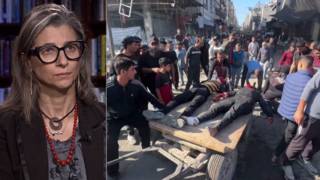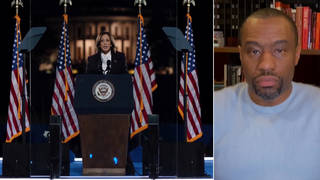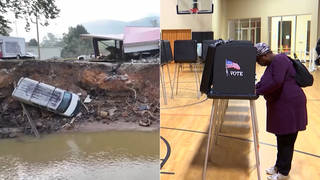
Related
As Benjamin Netanyahu faces mass protests at home and increasing diplomatic pressure abroad, we speak with Daniel Levy, a former Israeli peace negotiator and president of the U.S./Middle East Project. He says Netanyahu is desperate to save his political prospects, primarily by continuing the war on Gaza for as long as possible and undercutting ceasefire talks. “Prime Minister Netanyahu needs this war to continue and is willing and has already gone to extreme lengths to do so,” says Levy, who faults the Biden administration for not applying any real pressure on him. “Stop telling me that Netanyahu is a problem. You’re the problem, because you’re the enabler, you’re the facilitator.”
Transcript
AMY GOODMAN: So, your comment on this? Do you think the U.S. should cut off the arms flow to Israel? I mean, this is very significant coming from you. You were an adviser to past prime ministers. You’re a peace negotiator under two prime ministers of Israel. Do you think the U.S. should cut off the arms flow?
DANIEL LEVY: I think it depends, Amy. If the administration want to continue to see civilian deaths at an astronomical scale, a humanitarian catastrophe unparalleled, more than three times the number of children, according to Save the Children, killed in this conflict in Gaza as are killed in every conflict around the world in an entire year, if they want to continue to see that level of destruction, if they want to continue to see U.S. complicity in that, the U.S. violating the provisional measures of the International Court of Justice, the U.S. being the prime violator of international law rather than its upholder, then go ahead and continue to provide those offensive, destructive, horrific weapons.
If, by contrast, the U.S. wants to be within the law and wants to end this war, and, by the way, to successfully advance the negotiations to get a ceasefire and to get the hostages out, if that’s the goal of the Biden administration, stop telling me you’re heartbroken. Stop telling me, “This is so sad. We’re talking to the Israelis. They should do it differently. Let’s work out how to do Rafah.” Stop telling me that Netanyahu is a problem. You’re the problem, because you’re the enabler, you’re the facilitator, every single day that you continue to back this horrendous war, which is tragic for Palestinians and, I would argue, doing nothing to advance Israeli security, either — in fact, quite the opposite — and which now risks a broader regional escalation and conflagration after the latest provocation in Syria by Israel.
JUAN GONZÁLEZ: And, Daniel Levy, I wanted to ask you about that. We have only about a minute. But this latest provocation that you talked about, the attack in Syria, do you sense that Netanyahu, given the deep unpopularity that he has and the massive protests against him, is even willing to escalate this conflict more to be able to maintain his power?
DANIEL LEVY: It’s a crucial question, and I don’t see how we can’t take that very seriously. We have to take that seriously. He has bombed a diplomatic compound. He has done something which was clearly escalatory and a new level of provocation. Will Iran, Hezbollah maintain the kind of strategic patience that they’ve shown? Will there be pressure on this? There’s clearly not pressure to save Palestinian civilians, but is this where there might be pressure? I think we have to take very seriously that Prime Minister Netanyahu needs this war to continue and is willing and has already gone to extreme lengths to do so. There is a protest movement in Israel, not, unfortunately, against the war, but to prioritize getting a deal for the hostage release. We need everyone to lean into that, which requires real leverage and a real cost for Israel for continuing on this devastating path.
AMY GOODMAN: Daniel Levy, we want to thank you for being with us, president of the U.S./Middle East Project, former Israeli peace negotiator under Prime Ministers Ehud Barak and Yitzhak Rabin.
That does it for today’s show. Democracy Now! is currently accepting applications for our digital fellowship. Learn more and apply at democracynow.org.
I’ll also be in Berkeley celebrating KPFA’s 75th anniversary, the first Pacifica radio station. That’s Saturday night, April 6th. Go to our website at democracynow.org.
That’s it for our show. I’m Amy Goodman, with Juan González, for another edition of Democracy Now!












Media Options